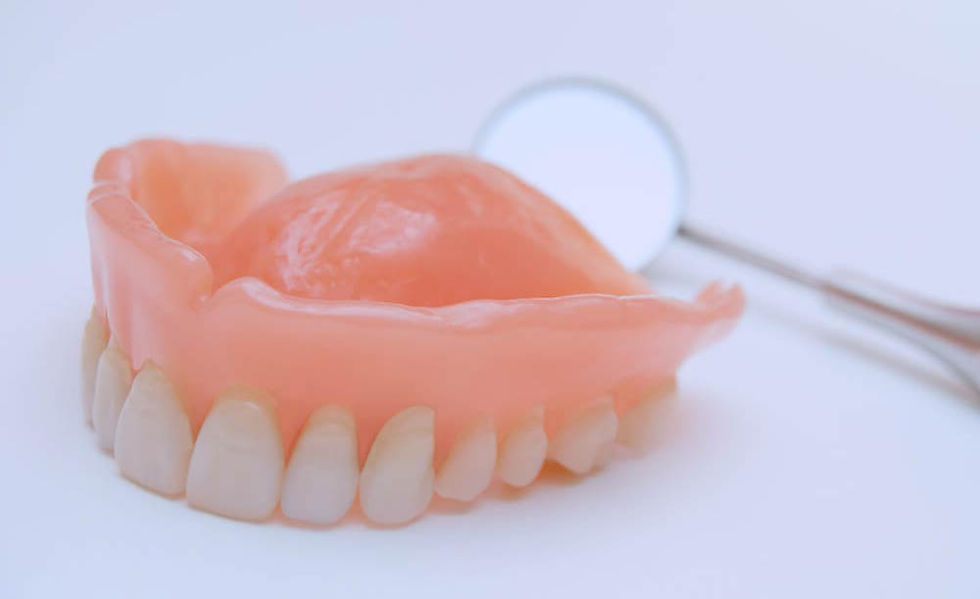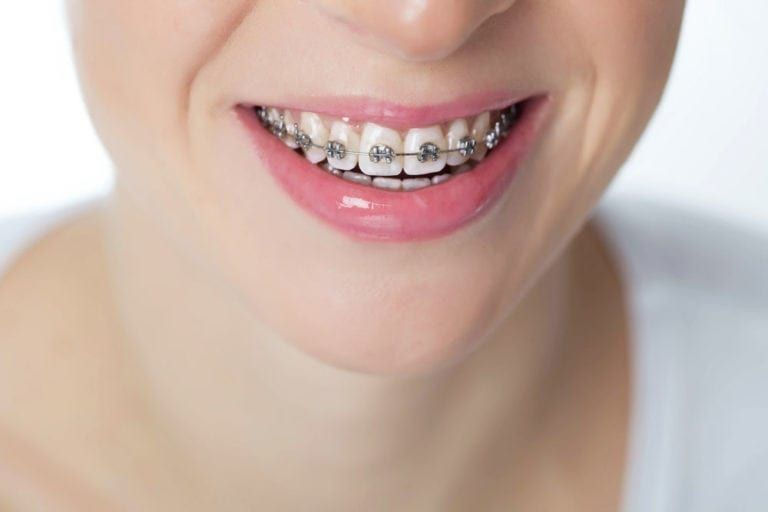What to Do If Your Dentures Feel Uncomfortable
- dclinicdubai
- Mar 12
- 5 min read
If you live in Dubai and have recently gotten dentures, you may experience some discomfort as your mouth adjusts to your new prosthetic teeth. While dentures are designed to restore the function and aesthetics of your smile, they can initially feel uncomfortable or awkward. Understanding how to address this discomfort can make the process much smoother and improve your overall experience with your new dentures. In this article, we’ll walk you through the steps to take if your teeth dentures feel uncomfortable and help you ensure they fit properly for long-term comfort and health.

Common Causes of Denture Discomfort:
Before addressing what to do about uncomfortable dentures, it’s important to understand the potential causes. Identifying why your dentures feel uncomfortable is the first step toward resolving the issue.
1. Ill-Fitting Dentures:
One of the most common causes of discomfort is poorly fitting dentures. If your dentures are too loose or too tight, they can cause soreness and irritation in your gums.
Loose dentures: If your dentures move around or slip when eating or speaking, it may cause irritation and sores.
Tight dentures: Dentures that are too tight can put excessive pressure on your gums, leading to pain and discomfort.
2. Gum Irritation:
After receiving dentures, your gums may be sensitive and require some time to heal. New dentures may cause irritation, especially if your gums are still adjusting to the prosthetic teeth.
Gum soreness: Your gums may feel tender or swollen as they get used to the pressure of the dentures.
Gum inflammation: Dentures that don’t fit properly can rub against the gums and cause inflammation or sores.
3. Changes in the Shape of Your Mouth:
Over time, the shape of your mouth and gums may change, which can affect the fit of your dentures. These changes are natural and can occur due to the loss of bone density or natural gum shrinkage.
Jawbone changes: The shape of your jawbone can shift after losing teeth, making it harder for your dentures to fit properly.
Gum shrinkage: Your gums may shrink over time, which can lead to dentures that no longer fit comfortably.
4. Dry Mouth:
A dry mouth is another factor that can cause discomfort while wearing dentures. Saliva helps to keep dentures in place and prevents irritation, but if your mouth is too dry, the dentures may not stay as securely in place.
Lack of saliva: Insufficient saliva can make it difficult for dentures to stay in place and cause friction on the gums.
Dry mouth syndrome: Certain medications or health conditions can cause dry mouth, leading to discomfort with dentures.
Steps to Take When Your Dentures Feel Uncomfortable:
If your dentures are causing discomfort, don’t worry—there are several ways to address the issue. Here’s a step-by-step guide on what to do when your dentures feel uncomfortable.
1. Visit Your Dentist in Dubai for a Check-Up:
If you notice discomfort, the first thing you should do is visit your dentist for a professional evaluation. Your dentist will assess whether the fit of your dentures needs to be adjusted or whether there are any other underlying issues that need to be addressed.
Fit adjustments: Your dentist can make minor adjustments to ensure your dentures fit correctly and comfortably.
Reline or remake: If the dentures no longer fit due to changes in your mouth, your dentist may recommend relining or remaking your dentures for a better fit.
2. Use Denture Adhesives:
If your dentures feel loose or slide around in your mouth, denture adhesives can help secure them in place. These adhesives create a temporary bond between the dentures and your gums, preventing slipping and improving comfort.
Temporary solution: Denture adhesives provide a quick and easy solution for loose dentures while waiting for a proper fit adjustment.
Comfort and stability: Using adhesive can enhance the overall comfort and help your dentures stay in place during eating and speaking.
3. Practice Denture Soaks and Cleaning:
Poor denture hygiene can contribute to discomfort, causing irritation and infections in the mouth. Ensure that you are cleaning your dentures thoroughly to maintain both comfort and oral health.
Denture cleaners: Use a denture-specific cleaning solution to soak your dentures overnight and remove any food particles or bacteria.
Proper brushing: Gently brush your dentures with a soft brush to remove plaque and food debris that may cause irritation.
4. Take Short Breaks from Wearing Your Dentures:
If your gums are sore or inflamed, giving your mouth a break from the dentures can provide relief. Removing the dentures for a few hours each day allows your gums to heal and reduces irritation.
Healing time: Taking breaks can help soothe inflamed gums and prevent further discomfort.
Gum care: During breaks, clean your gums and mouth with a soft cloth or brush to remove any bacteria and keep the area fresh.
5. Adjust Your Diet:
If you’re finding it difficult to chew with your dentures, try adjusting your diet until you’re more comfortable. Soft foods that are easy to chew can give your gums time to adjust while minimizing discomfort.
Soft foods: Opt for foods like mashed potatoes, yogurt, and soups that don’t require much chewing.
Avoid tough foods: Stay away from hard, sticky, or chewy foods that can put extra pressure on your dentures and cause discomfort.
Preventing Denture Discomfort in the Future:
Once you've addressed the immediate discomfort, it’s important to take steps to prevent future issues. Here’s how to ensure your dentures remain comfortable over time:
1. Regular Check-Ups with Your Dentist:
Regular visits to your dentist are essential for maintaining a comfortable fit and addressing any issues before they become problematic. Your dentist will check the condition of your dentures, as well as the health of your gums and mouth.
Adjustments and repairs: Dentists can make any necessary adjustments to ensure your dentures continue to fit correctly as your mouth changes.
Gum health: Regular dental check-ups allow your dentist to monitor your gum health and make sure there are no underlying issues affecting the comfort of your dentures.
2. Proper Care and Maintenance:
Maintaining your dentures is crucial for ensuring they remain comfortable and functional. Follow a regular cleaning routine and store your dentures properly to prevent damage.
Daily cleaning: Clean your dentures after every meal to remove food particles and plaque buildup.
Proper storage: When not wearing your dentures, store them in a moist container to prevent them from drying out or becoming warped.
3. Stay Hydrated:
Ensure you drink enough water throughout the day to keep your mouth hydrated. This can help reduce friction and prevent dry mouth, which can contribute to discomfort while wearing dentures.
Hydrate regularly: Drinking water keeps your mouth moist and helps the dentures stay secure in place.
Dry mouth remedies: If you suffer from dry mouth, talk to your dentist about saliva substitutes or other treatments that can help relieve this condition.
4. Be Patient with Adjustments:
Adjusting to dentures can take time, and some discomfort is normal in the first few weeks. However, if discomfort persists beyond a few weeks, it’s important to consult with your dentist to ensure your dentures are fitting properly and to address any concerns.
Allow time for healing: Your mouth needs time to adjust to the dentures, so be patient during the initial phase.
Monitor any discomfort: Keep track of any changes in discomfort levels and consult your dentist if you notice persistent pain or irritation.
Conclusion:
Dentures should fit comfortably and restore your ability to eat, speak, and smile with confidence. However, some discomfort is common, especially during the initial adjustment period. If your dentures feel uncomfortable, don't hesitate to consult with your dentist in Dubai to address the issue. From minor adjustments to using denture adhesives or changing your diet, there are several steps you can take to alleviate discomfort and enjoy the full benefits of your new dentures. By following proper care and maintenance practices, you can ensure your dentures remain comfortable and functional for years to come.


Comments